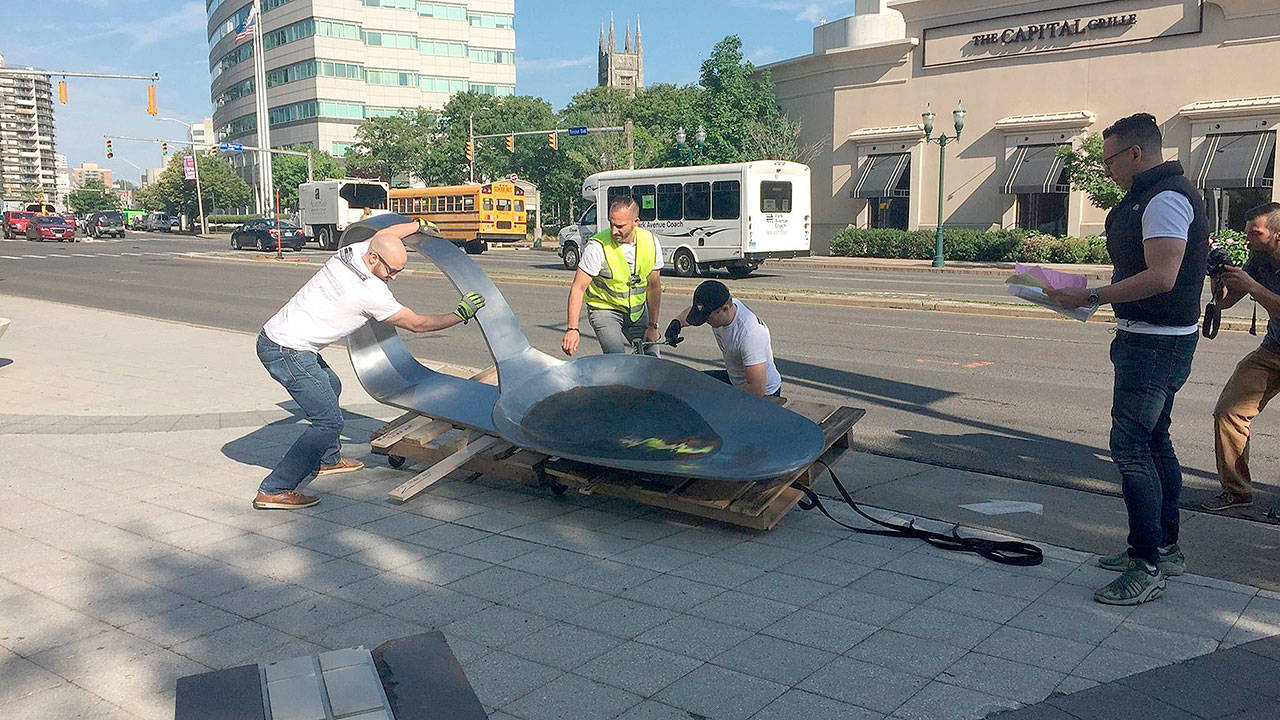STAMFORD, Conn. — A Stamford, Conn., art gallery owner was arrested and charged with a criminal misdemeanor and a felony Friday morning after dropping an 800-pound steel sculpture of a bent, burnt heroin spoon in front of Purdue Pharma, a top manufacturer of opioids, and then refusing to remove it.
Fernando Luis Alvarez, who is mounting an exhibit on the opioid epidemic, was charged with obstruction of free passage for his act of “guerrilla art,” and for interfering with police in front of the 201 Tresser Blvd. corporate headquarters. The spoon was placed in an automotive drop-off spot, making the path unusable. The placement of the sculpture was the misdemeanor charge; refusal to remove it resulted in the felony charge.
Police also informed Alvarez he might be charged financially for the removal and storage of the artwork, which is 10 1/2 feet long.
Alvarez said the sculpture and its placement are a statement intended to create a groundswell of outrage against Purdue and the billionaire Sackler family, who are majority owners of the company, which developed OxyContin.
“I have been extremely bothered and moved by the architects of this epidemic,” Alvarez said. “I want to hold this family responsible for what they created and put in front of society and created a modern-day massacre.”
The interactions between Alvarez and police were cordial. While waiting to issue the summons, the gallerist and the cops chatted amiably about civic matters and the opioid epidemic.
The sculpture, named “Purdue,” was made by Boston-based artist Domenic Esposito, who was present at the time of the sculpture drop. Esposito was not charged or arrested. He said before the art drop that he and Alvarez decided who would take the criminal charges.
Esposito said he was inspired to create the artwork by his brother’s drug addiction. Esposito said his brother started with OxyContin and Percocet and moved to heroin.
“People say (OxyContin and Percocet) aren’t a big deal, but then you’re hooked and you run out of money and you turn to heroin.”
Esposito’s brother Danny has been struggling with addiction for almost 14 years and has overdosed a few times.
“My mom would call me in a panic … screaming she found another burnt spoon,” Esposito said. “This is a story thousands of families go through. He’s lucky to be alive.”
In 2007, Purdue pleaded guilty in federal court to mislabeling OxyContin and misleading the public about the risk of addiction, and had to pay $600 million. Three company executives were convicted of criminal charges. The firm has been and remains the target of numerous lawsuits, with legal actions against it increasing since the opioid epidemic reached a critical stage.
Robert Josephson, a spokesperson for Purdue, released a statement Friday morning.
“We share the protesters’ concern about the opioid crisis, and respect their right to peacefully express themselves. Purdue is committed to working collaboratively with those affected by this public health crisis on meaningful solutions to help stem the tide of opioid-related overdose deaths.”
The statement also said that Purdue announced in February that it had ended promotion of opioids to prescribers, and that earlier this month it had eliminated its sales force.
At 10:45 a.m., workers from the city public works department showed up with a backhoe, scooped up the spoon and loaded it onto a flatbed truck to be taken away. Police said the sculpture would be registered as evidence.




